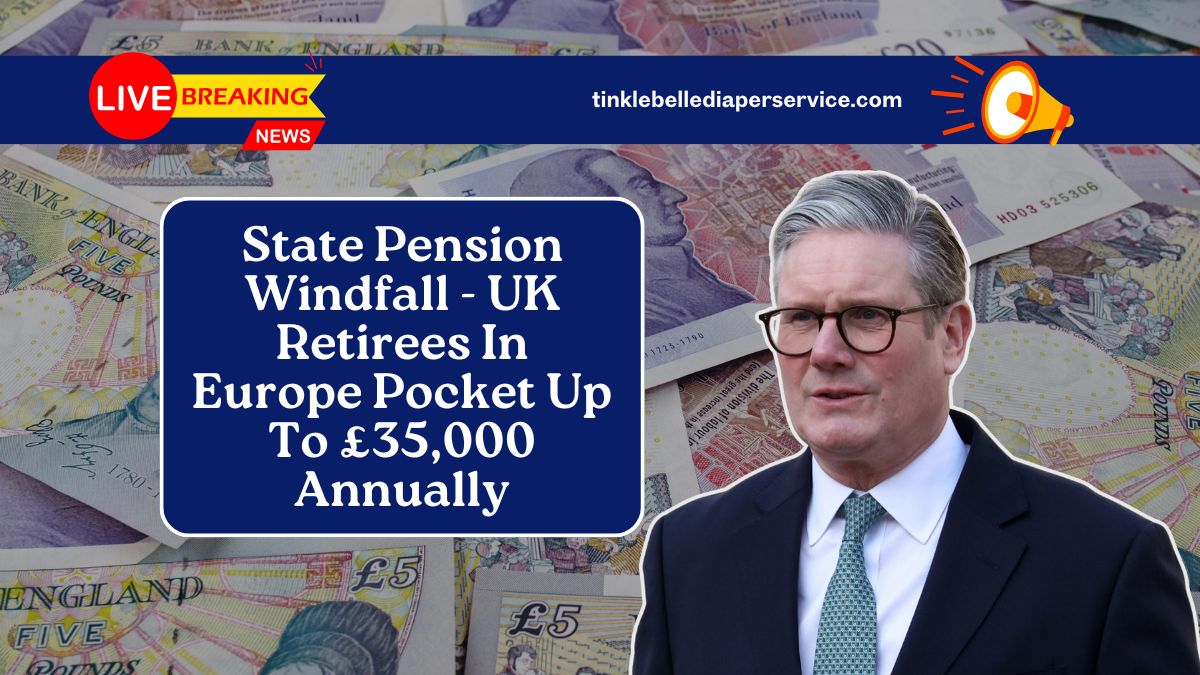A recent analysis reveals that British retirees living in the European Union are benefiting from state pensions reaching as high as £35,500 per year—all without paying a penny of UK income tax.
Nearly half a million pensioners have relocated to EU countries, leveraging double taxation treaties and frozen UK tax thresholds to enjoy more generous take-home pay than their counterparts at home .
Nearly 500,000 Recipients Living Abroad
According to the latest Department for Work and Pensions figures, 480,906 UK state pension recipients were residing in the EU as of August 2024.
Of these, roughly 42,000 are receiving annual pension payments that exceed the £12,570 personal tax allowance, a level at which UK-based retirees would begin paying income tax.
Why European Expats Pay No UK Tax
The key factor enabling this windfall is the network of double taxation treaties between the UK and EU nations. These agreements ensure British citizens in Europe are not taxed twice on the same pension income: once by the UK and again by their country of residence.
Meanwhile, domestic pensioners face mounting tax bills as the personal allowance remains frozen at £12,570 until 2028, pushing more of their pension income into taxable territory.
How Some Expats Receive Three Times the “Full” Pension
Britain’s state pension system can deliver amounts well above the standard “full” pension (£11,973 per year following a 4.1% increase under the triple lock).
Certain retirees qualify for additional top-ups through the State Earnings-Related Pension Scheme (SERPS) or by delaying their claim, potentially boosting their annual payment by up to £11,356 .
This can bring total pensions to roughly three times the base rate for a small group of beneficiaries.
EU-Based State Pension Recipients
| Category | Figure |
|---|---|
| Total UK State Pensioners in EU (Aug 2024) | 480,906 |
| Recipients Exceeding £12,570 Allowance | 42,000 |
| Maximum Weekly Pension (Top 6 Expats) | £680–£690 |
| Maximum Annual Pension (Top 6 Expats) | £35,500 |
| Full New State Pension (2025) | £11,973 |
| Full Old State Pension | £11,976 |
| Personal Tax Allowance (Frozen to 2028) | £12,570 |
| Potential SERPS Top-up | Up to £11,356 additional |
Impact on UK-Based Pensioners
By contrast, 3.3 million pensioners in the UK already receive annual pensions above £12,570, meaning they pay income tax on any amount over that allowance.
With tax thresholds frozen since 2021, growing pension payments under the triple lock (4.1% rise last year) are increasingly pushing retirees into higher tax brackets.
This dynamic has exacerbated the so-called “retirement tax” burden for domestic pensioners.
Voices from the Experts
David Denton, a tax specialist, explains:
“Those living abroad may take home more income than their UK counterparts because expatriates often avoid UK tax on pensions exceeding the personal allowance—effectively giving them a hidden pay rise.”
Meanwhile, Baroness Ros Altmann, former pensions minister, warns that the combination of a frozen allowance and rising pensions is unsustainable:
“The real problem is that the frozen threshold is perilously close to the full new state pension, squeezing those who remain in the UK” .
What This Means for Prospective Expatriates
For retirees considering a move to Europe, the financial benefits are clear:
- Tax-Free Pensions: Thanks to existing treaties, their entire state pension can remain untaxed by the UK government.
- Higher Take-Home Pay: Those whose pensions exceed £12,570 can avoid UK income tax entirely—potentially saving thousands annually.
- Access to Top-Ups: Mechanisms like SERPS and deferred claims can magnify their pension beyond the standard full rate.
The disparity between UK-based and EU-resident pensioners underscores the complexity—and inequality—within Britain’s retirement system. As 480,906 expat retirees enjoy tax-free incomes of up to £35,500 a year, millions at home face a rising tax burden.
With personal allowances frozen until 2028 and pension incomes climbing, this “retirement tax” gap is set to widen—fueling a fresh debate on fairness and the future of pension taxation in the UK.
FAQs
How do double taxation treaties protect UK expats’ pensions?
Double taxation agreements ensure that UK state pensions are only taxed once, often in the country of residence—not by the UK—allowing expats to keep the full amount.
Can UK pensioners in Europe still benefit from the triple lock?
Yes. Expatriates receive the annual increases (triple lock) just like domestic pensioners, but without the risk of crossing the tax allowance threshold and incurring UK income tax.
What options do UK-based retirees have to reduce pension tax?
Domestic pensioners can consider deferring their state pension to boost payments, maximizing SERPS top-ups, or splitting income across lower-tax years—though none match the tax advantages of living abroad.

